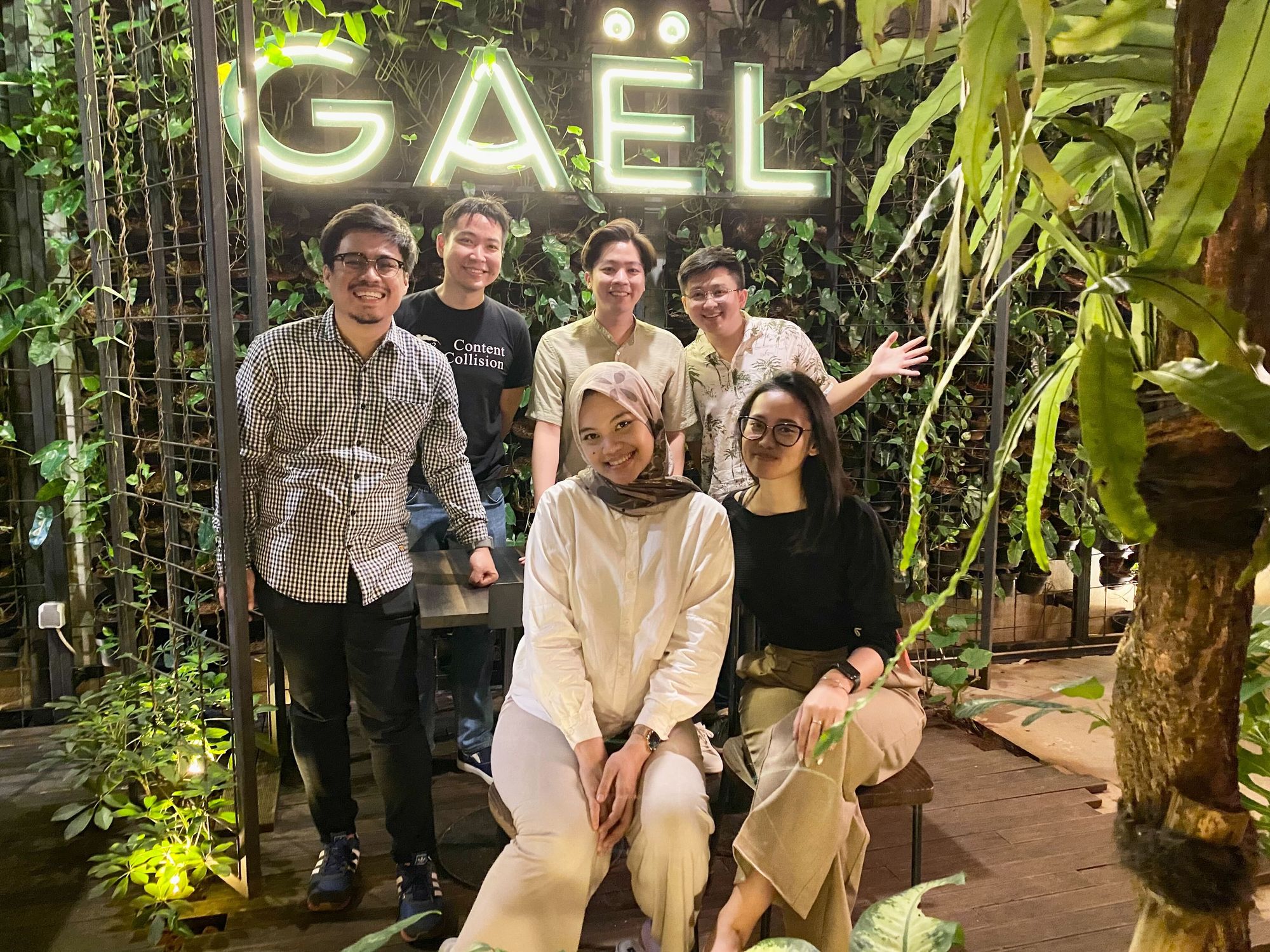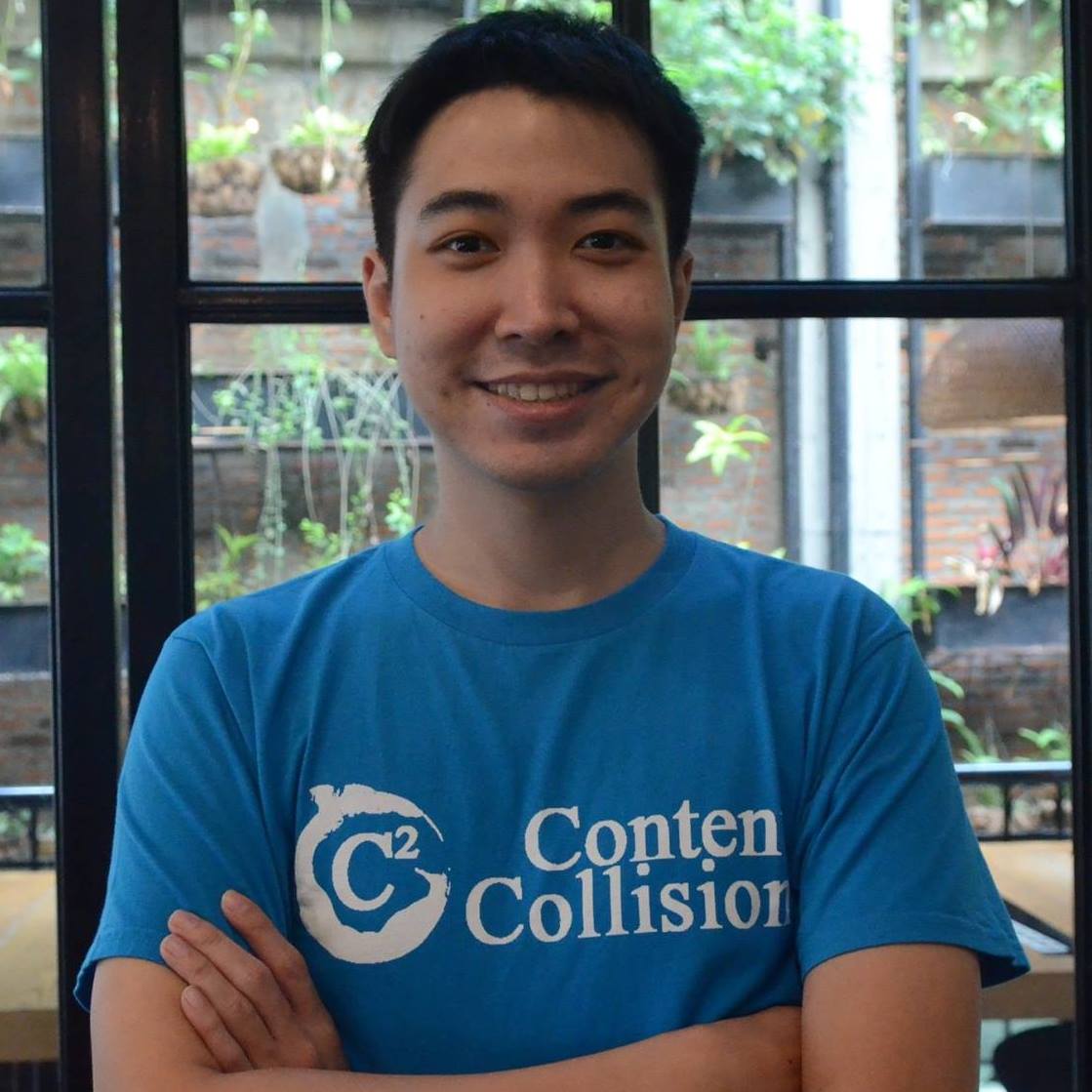Jakarta, Indonesia
"That question hits me right in the heart!" It's around thirty minutes into our hour-long conversation, and I've asked Enricko Lukman about imposter syndrome. Does the CEO of C2 Media — a venture capital-funded, globally focused, and growing media tech startup, ever feel such a thing?
"Pretty much all the time," he confesses. "It's almost as though you see all the good things that have happened as good luck rather than good work!"
There's also the issue of comparing oneself and one's company to others. "Under East Ventures alone (C2 Media's investor), there are tons of amazing founders and some startups that have grown 1000X, so you tend to look at that and think, 'Wow, they're way more successful.'"
Enricko is as refreshingly honest as interview subjects come. He doesn't act like the stereotypical fast-growth startup CEO. There's little in the way of hype, empty rhetoric, or (let's face it) borderline overconfidence. He speaks openly about uncertainty, self-doubt, and imposter syndrome.
For all his humility, however, Lukman has more to brag about than most. Indeed, the whole time we speak, there is a steady, calm confidence in the company he co-founded.
An APAC media company thinking globally
C2 Media is a group of four complementary brands. There's Content Collision — a PR agency for APAC-based tech companies. There's ContentGrip — a digital media platform that predominantly covers the intersection of business, marketing, and tech. Its sister podcast, Comms in Asia, unpacks the world of communication and technology in Asia Pacific. And finally, there's the younger, bolder sibling of Content Collision — ContentGrow.
ContentGrow is a tech platform for freelance writers, and it's on a mission to empower the independent content creator community worldwide. Or, to borrow the company's own description: A managed talent network for brands and publishers to work with high-quality freelance writers and journalists worldwide. Think UpWork, but dedicated explicitly to writers and content teams. It's ContentGrow that's received the backing of Venture Capital group East Ventures and, on the surface, looks to be the most scalable.
"I started Content Collision with an old colleague in 2015." Lukman elaborates, "In truth, it was actually a side hustle to fund another business I'd started during university — an education and scholarship information platform (which failed, by the way). We started working with other freelancers and subcontracting the work to them.
After a year, the education platform wasn't doing well, but the content production 'side hustle' was getting a lot of demand. So we went full-time at it. But over time, we found a challenge [in] scaling. It was a fully boutique service, and the more clients we had, the more full-time staff we needed. But clients come and go, and we'd find ourselves too bloated.
That's where we got the inspiration for ContentGrow, which we launched in 2019. We needed to go back to our roots of having mostly freelancers. And we also figured that a lot of other content teams would be interested in the potential to scale their operations up and down with freelancers rather than full-time staff."
From journalist to entrepreneur
What's interesting about interviewing Enricko is that, not so long ago, he was the one asking the questions. In 2012, he joined Tech in Asia as a journalist. Indeed it was his curiosity about entrepreneurship that led him down this path.
Tech in Asia was a small media company back then — far from the widely respected and read media platform it is today. "I was one of the first people to cover the tech startup industry in Indonesia — there wasn't much coverage back then. It started with just me at the Indonesian bureau. But I led the editorial team expansion to 25 people."
Lukman was keen to seize the opportunity to use his credentials to meet forward-thinking company founders from whom he would take inspiration. "I was really interested in entrepreneurship and could see that tech was the place to be. Being a journalist at even a small startup, you can get VIP access to amazing founders and investors, and speak with them and learn from them."
He namechecks early meetings with now globally celebrated companies. "I was able to speak with the founders of Traveloka and the people behind Gojek before it was even launched. They were super inspiring, and I got to learn from them. On top of interviewing them for a magazine feature, I got to ask them more business-related questions — 'How did you know? How did you do this? How did you make that call?' So it helped ignite my entrepreneurial spark, and eventually, I gave it a shot."

Imposter syndrome at home and abroad
For most founders and entrepreneurs, it's easy to relate to Lukman's position. The more you progress, the more success you attract. But self-doubt often intrudes on your internal dialogue.
Though he's disarmingly open about it, Lukman is also practical. He explains in simple terms why we only hear a little about it from CEOs and senior leaders at ambitious startups. "When you're talking to the media about your company or even to your team, you need to look strong, you need to be a leader, and always convey confidence."
However, he's also quick to point out there's often a change of tone away from the media gaze and in the company of friends in the entrepreneurial ecosystem. "One of the nicest things about having some fellow entrepreneurs as friends is that we can also see their struggle — we can share thoughts, ideas, and concerns. We can see that it's not always rosy, right?"
Lukman is also practical in dealing with discomfort. "I just focus on the work. Block out the crowd and focus on making your product better and your users happier. In those moments, you're not comparing yourself to others. Just focus on the work, and you'll get there," he asserts.
When discussing the Southeast Asia startup ecosystem, which, though facing a challenging year, has generally been booming for the last decade, our conversation returns to another form of imposter syndrome — a regional one. "If you're in Southeast Asia, almost everyone wants to solve local problems only. Of course, they have a local advantage, so that makes sense. But I think it's okay to solve problems globally."
Part of the issue may be a lack of confidence in addressing overseas markets — where English is the common tongue. Enricko, for the record, speaks perfect English, as do his partners. But that didn't stop them from self-doubting when taking their sales pitches to the international market. "Both my business partner and I had that problem in the beginning. I would think to myself, 'Man, is my English even good enough? We're selling content, after all."
Despite their initial uncertainty, C2 Media's client list includes several Blue Chip brands and international media houses like the South China Morning Post and Cision. It's clear Lukman's determination to think globally is paying off.
Finding balance
Before our time runs out, our conversation turns to the everyday-hustle mentality — both the rewards it can yield and the damage it can do. In the early days of ContentGrow, the hustle was on. "We worked weekends, pulled all-nighters, put in the overtime, you name it. We needed to outwork everyone else! But it wasn't sustainable."
One change the company implemented was to go fully remote. C2 Media is based in Jakarta, as is Enricko. But today, he's talking from his hotel room in Seminyak, Bali, where he's been for the last few weeks. David Heinemeier Hansson and Jason Fried's popular book Remote: Office Not Required influenced this shift, and its paying dividends for the people of C2 Media, "We're still working on it, but we're really trying to make sure that everyone has a much healthier work-life balance."
Enricko admits that even now, he doesn't have much free time, but weekends are 90% his own, and he's better at focusing on other things outside of his career. That's why he's taken up running and is currently training for his first marathon at the end of the year. He uses some gaming terminology to explain his shift in mentality. "I'm very career focused — that's my main mission. But I've realized that sometimes it's okay to win the side quest before the main one."
This doesn't mean that Lukman and the C2 Media team are slacking. They already put in the hard yards to get things moving. Now it's about keeping up the momentum while ensuring the wheels don't come off. The way he sees it, there's still a time and place for the old-fashioned fundamentals of hard work and total commitment. When asked for advice for would-be entrepreneurs, Enricko's is simple and concise: "Give 100%. Put enough hours into it — especially early — to validate the business."
His final and perhaps most valuable advice addresses the "unicorn" – omnipresent in business discourse yet elusive in reality. The simple truth is that the overwhelming majority of startups aren't going to hit the billion-dollar valuation. Indeed, plenty fall by the wayside in the pursuit, unable to manage the speed wobbles that come with a rapid scale up. As far as Enricko is concerned, that's fine. "There's nothing wrong with just building a business that makes a profit early and has slow, steady growth. It's okay to build a 'cockroach startup' rather than the next 'unicorn.'"
That's reassuring to hear; frankly, it's not said enough. Even so, don't be surprised to see a few extra zeros added to C2 Media's valuation over the next few years.

